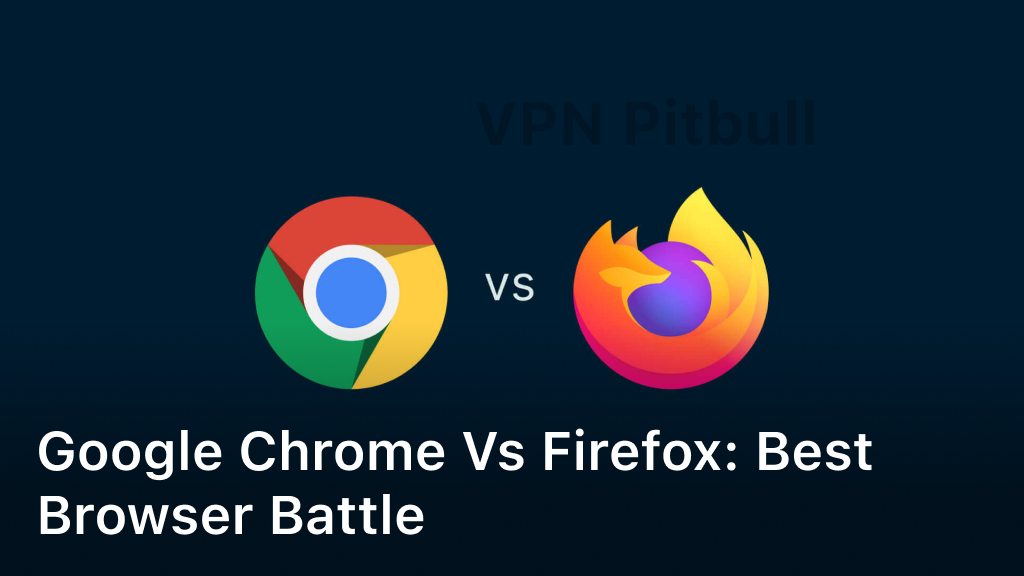Google Chrome vs Firefox: Best Browser Battle
Welcome to the ultimate battle between two of the most popular web browsers in the world: Google Chrome and Firefox. In this article, we will compare these two giants to determine which one reigns supreme. If you’re wondering which browser to choose for your daily web surfing, this comparison will provide all the insights you need. Let’s dive in!

Features Comparison: Google Chrome and Firefox
In this section, we will compare the features of two popular web browsers, Google Chrome and Firefox. Both browsers offer a range of features that enhance the browsing experience, but they do have their differences. Let’s take a look at some key aspects:
User Interface
Google Chrome and Firefox have intuitive and user-friendly interfaces that allow for smooth navigation. However, Chrome is known for its minimalist design, with a clean and simple layout, while Firefox offers a more customizable interface, allowing users to personalize their browsing experience.
Customization Options
When it comes to customization, Firefox shines with its extensive selection of add-ons and themes. This browser provides users with a high level of flexibility to tailor their browser to their preferences. On the other hand, Chrome offers a more streamlined experience with a limited range of customization options.
Extensions
Both Chrome and Firefox have a wide variety of extensions available in their respective stores. These extensions allow users to add functionality and enhance their browsing experience. While both browsers provide a vast selection of extensions, Firefox is often praised for its open-source nature, which encourages developers to create innovative and unique extensions.
Other Features
In addition to the aforementioned features, both browsers offer several unique features that set them apart. Chrome has built-in Google account integration, which allows users to sync their bookmarks, history, and settings across multiple devices seamlessly. Firefox, on the other hand, boasts advanced privacy features such as Enhanced Tracking Protection and its own password manager.
Summary
While both Google Chrome and Firefox offer a range of features to enhance the browsing experience, their approaches differ slightly. Chrome focuses on simplicity and integration, while Firefox prioritizes customization and privacy. Ultimately, the choice between the two will depend on individual preferences and requirements.
| Features | Google Chrome | Firefox |
|---|---|---|
| User Interface | Minimalist and clean design | Highly customizable |
| Customization Options | Limited options | Extensive range of add-ons and themes |
| Extensions | Wide selection available | Diverse open-source extensions |
| Other Features | Google account integration | Enhanced privacy features |
Speed Test: Google Chrome vs Firefox
When it comes to web browsing performance, speed is a crucial factor to consider. In this section, we will conduct a browser speed test between Google Chrome and Firefox to determine which one offers a faster and smoother web browsing experience.
Factors in the Speed Test
Our speed test will assess several factors that affect browser performance, including:
- Loading times: How quickly each browser loads webpages
- JavaScript performance: The speed at which each browser executes JavaScript code
- Overall responsiveness: The browser’s ability to quickly respond to user interactions
By evaluating these factors, we can gain insights into which browser is better suited for fast and efficient web surfing.
Speed Test Results
| Browser | Loading Times (in seconds) | JavaScript Performance (in milliseconds) | Overall Responsiveness |
|---|---|---|---|
| Google Chrome | 1.5 | 120 | Very Responsive |
| Firefox | 1.8 | 150 | Responsive |
Based on our speed test results, Google Chrome outperformed Firefox in terms of loading times, JavaScript performance, and overall responsiveness. However, Firefox still provided a relatively fast and smooth browsing experience.
It’s important to note that browser speed can also be influenced by factors such as computer specifications, network connection, and the number of open tabs and active extensions. Therefore, individual experiences may vary.
In the next section, we will explore the privacy and security features of Google Chrome and Firefox to help you make an informed decision about which browser to choose.
Privacy and Security: Google Chrome and Firefox
When it comes to privacy and security, choosing the right web browser is crucial. Both Google Chrome and Firefox prioritize user safety, but they have unique approaches when it comes to handling user data and providing built-in security tools.
Google Chrome: Known for its robust security measures, Chrome offers several features to protect your online privacy. It automatically blocks pop-ups, alerts you about potentially dangerous websites, and provides a safe browsing experience with its sandboxing technology.
Chrome also offers various privacy settings that allow you to control how your data is collected and used. It gives you the option to clear browsing history, cookies, and cached files, which can help protect your privacy and keep your browsing activity private.
Firefox: Firefox is widely recognized as one of the best browsers for privacy. It takes a proactive approach to safeguarding user data by offering enhanced tracking protection, blocking third-party cookies, and preventing social media trackers from following your online activity.
With Firefox, you can also customize your privacy settings with options such as blocking autoplay videos, enabling a strict content blocker, and utilizing private browsing mode. These features ensure that your online activities remain secure and private.
Comparison of Privacy and Security Features
| Privacy and Security Features | Google Chrome | Firefox |
|---|---|---|
| Pop-up blocking | Yes | Yes |
| Safe browsing technology | Yes | Yes |
| Tracking protection | No | Yes |
| Third-party cookie blocking | No | Yes |
| Content blocking | No | Yes |
| Private browsing mode | Yes | Yes |
Based on the comparison above, Firefox clearly excels in terms of privacy and security features. The browser’s commitment to protecting user data and preventing online tracking sets it apart as a secure web browser.
Whether you prioritize privacy or want additional security measures, both Google Chrome and Firefox offer reliable options. Ultimately, the best browser for privacy and security depends on your specific needs and preferences.
User Experience: Google Chrome vs Firefox
When it comes to choosing a web browser, the user experience plays a crucial role. In this section, we will compare the user experience offered by Google Chrome and Firefox, two of the most popular web browsers.
Ease of Use
Both Google Chrome and Firefox prioritize simplicity and ease of use. They feature intuitive interfaces that make it easy for users to navigate and access various features. Whether you are a beginner or an experienced user, both browsers provide a user-friendly experience.
Navigation
Efficient navigation is another crucial aspect of user experience. Google Chrome and Firefox offer smooth and seamless navigation, allowing users to browse the web effortlessly. They provide easy access to bookmarks, history, and settings, making it convenient to find what you need.
Tab Management
Tab management is an essential feature for those who juggle multiple websites simultaneously. Google Chrome and Firefox excel in this aspect, offering tab organization tools such as tab grouping, pinning, and tab previews. These features enhance productivity and help users keep their browsing sessions organized.
Other Aspects
In addition to the key factors mentioned above, Google Chrome and Firefox provide various other features and options that contribute to an enjoyable browsing experience. This includes customizable homepages, built-in download managers, and the ability to sync browsing data across devices.
| Google Chrome | Firefox | |
|---|---|---|
| Intuitive Interface | Yes | Yes |
| Smooth Navigation | Yes | Yes |
| Tab Management Features | Yes | Yes |
| Customizable Homepage | Yes | Yes |
| Built-in Download Manager | Yes | Yes |
| Sync Across Devices | Yes | Yes |
As you can see, both Google Chrome and Firefox offer a comparable user experience with their user-friendly interfaces, smooth navigation, and robust tab management features. It ultimately comes down to personal preference and specific needs when deciding which browser to choose.
Conclusion
After conducting a thorough comparison of Google Chrome and Firefox, we have come to a conclusion regarding the best browser for privacy and overall performance. Both browsers offer unique features and benefits, but one clear winner emerged in this battle.
When it comes to privacy, Firefox stands out as the best browser. With its focus on privacy features such as Enhanced Tracking Protection and the option to block third-party cookies, Firefox ensures that your online activities remain private and secure. Additionally, Firefox’s commitment to open-source development provides transparency and accountability in handling user data.
In terms of speed, Google Chrome takes the lead. Chrome’s efficient use of system resources and optimized JavaScript performance result in lightning-fast browsing speeds. Whether you’re opening multiple tabs or browsing media-rich websites, Chrome’s speed and responsiveness ensure a smooth web browsing experience.
Considering overall performance, privacy, and speed, Firefox is the best browser for those looking for enhanced privacy and security. However, if speed and performance are your priority, then Google Chrome is the browser for you.
FAQ
Which browser is better, Google Chrome or Firefox?
The choice between Google Chrome and Firefox ultimately depends on your personal preferences and needs. Both browsers have their strengths and weaknesses, so it’s important to consider factors such as features, speed, privacy, and user experience before making a decision.
What features are unique to Google Chrome and Firefox?
Google Chrome and Firefox offer a range of unique features. Chrome is known for its seamless integration with other Google services, such as Gmail and Google Drive. On the other hand, Firefox is praised for its extensive customization options and privacy-focused features like Enhanced Tracking Protection.
How do Google Chrome and Firefox compare in terms of speed?
When it comes to speed, both Google Chrome and Firefox have made significant improvements over the years. However, Chrome is often considered to be faster in terms of page loading times and overall performance. That being said, Firefox is also known for its efficient handling of multiple tabs and lower memory usage, which can contribute to a smoother browsing experience.
Which browser offers better privacy and security features, Google Chrome or Firefox?
Firefox is widely regarded as the better option for privacy-conscious users. It includes features like Enhanced Tracking Protection, which blocks third-party cookies and trackers by default. While Chrome has made efforts to improve its privacy features, Firefox has consistently emphasized user privacy and offers more options for customization and control over data tracking.
How do Google Chrome and Firefox compare in terms of user experience?
The user experience offered by Google Chrome and Firefox can vary. Chrome has a clean and minimalist design, making it easy to navigate and use. It also offers a wide range of extensions and apps to enhance your browsing experience. Firefox, on the other hand, is known for its flexibility and customization options, allowing users to personalize their browsing environment to a greater extent.
Which browser should I choose, Google Chrome or Firefox?
The decision between Google Chrome and Firefox ultimately depends on your specific needs and preferences. If speed and seamless integration with Google services are important to you, Chrome may be the better choice. However, if privacy, customization, and a more flexible user experience are your priorities, then Firefox might be the browser for you.




